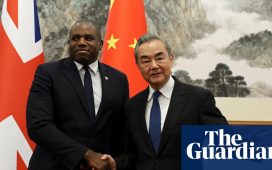The Home Office should have taken greater heed to the impact on the UK’s reputation if a successful attack on Prince Harry were to take place, his lawyers have argued.
The Duke of Sussex is challenging the UK government’s decision to strip him of security when he moved to US, one of five legal cases he has in the High Court.
A judge heard on Tuesday that the duke is “plainly” part of the group that Ravec – the Executive Committee for the Protection of Royalty and Public Figures – has to consider despite no longer being a working royal.
Shaheed Fatima KC, who is representing the duke, said: “The claimant’s consistent position has been, and remains, that he should be given state security in light of the threats/risks he faces.”
This latest hearing forms part of five ongoing legal battles Prince Harry has in the High Court
(AP)
He has argued the Home Office committee had “failed to treat [him] as it treated others” in denying him automatic police protection when in the UK, and that he had been treated “less favourably”.
Given that his security was to prevent the risk of an attack, the current “case-by-case” provision created “excessive uncertainty and hardship” for himself and for his current security detail.
The duke also accused Ravec of acting “irrationally” and failing to follow its own written policies in changing the “same degree” of personal security previously afforded to him as a working royal.
Meanwhile, the Home Office said that he was treated in a lawful “bespoke manner”, and that the risks of a successful attack had been considered. However, given that he was no longer a working senior royal and had relocated to the US, his position had “materially changed”.
At the start of the duke’s legal challenge over the decision to change the level of his protective security when visiting the UK, Ms Fatima said: “This case is about the right to safety and security of a person, there could not be a right of greater importance to any of us.”
Harry is taking action against the Home Office after being told by Ravec in 2020 that he would no longer be given the “same degree” of personal protective security when visiting.
Harry and Meghan at the One World Trade Center in Manhattan, New York
(Reuters)
In written submissions, his barrister said: “Ravec should have considered the ‘impact’ that a successful attack on the claimant would have, bearing in mind his status, background and profile within the royal family – which he was born into and which he will have for the rest of his life – and his ongoing charity work and service to the public.
“Ravec should have considered, in particular, the impact on the UK’s reputation of a successful attack on the claimant.”
The High Court heard that the death of Diana, Princess of Wales, was raised as part of the decision over his security, with Sir James Eadie KC for the Home Office stating: “Ravec was aware of the wider ‘impact’ following the tragic death of the claimant’s mother, and this was also a matter referenced by the royal household.”
The barrister added there would be “likely significant public upset were a successful attack on the claimant to take place”. However, the decision involved a “lawful balancing” of relevant factors, with Harry now required to provide 28 days’ notice for protective security.
During his visit to a WellChild event in June 2021, his car was chased by photographers yet the Home Office barrister said he had provided the details “materially later” than the 28 days required.
His lawyers argued the Home Office should have considered the impact of a successful attack on the UK’s reputation
(Getty)
However, Mr Justice Lane heard that the duke had not been given an opportunity to make representations to Ravec before the decision was made, and that he was “entitled to be informed” of the relevant policies applied in order to make “informed submissions”.
Harry claimed to have been subjected to “unfair treatment” and that a “far inferior” procedure had been imposed by Ravec, which lacked the critical safeguards in their written policy.
“No good reason has been provided for singling the claimant out in this way,” his barrister told the judge, adding that the duke had only discovered that the policy would not apply to him because he brought legal proceedings, forcing the government to “disclose this fact”.
She claimed that he had been given no explanation for such treatment, and as far as they were aware, it was the first time Ravec had “deviated from its own policy” in this way.
Security is provided on a ‘case-by-case’ basis when he returns to the UK
(PA)
The duke was cleared to bring the challenge in July 2022 and the claim will be heard over two-and-a-half days starting from Tuesday.
However, the majority of the hearing will be heard behind closed doors, after a a privacy order was issued over concerns that a vast amount of the evidential material cannot enter the public domain.
In making the bid for the challenge, lawyers for Harry said the security arrangements set out in a letter from Ravec, and their application when he visited the UK in June 2021, were invalid due to “procedural unfairness” because he was not given an opportunity to make representations.
Shaheed Fatima KC, for the duke, told the High Court in London last year: “He didn’t know at that stage that the Royal Household was involved at all… he was told it was an independent decision.”
On behalf of the Home Office, Sir James wrote in their submissions: “Ravec has, accordingly, treated the claimant in a bespoke manner.
“He is no longer a member of the cohort of individuals whose security position remains under regular review by Ravec. But he is brought back within the cohort in the appropriate circumstances.”
The hearing is due to continue until Thursday.












